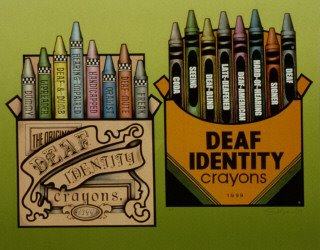As I repeatedly told anyone who would listen to me, last weekend I went to a conference in Toronto. While there, I visited Toronto’s Deaf Culture Centre. [1. Little-d deafness is the “medical” condition of not being able to hear, or hearing very little. Big-d Deafness is being a member of a cultural & linguistic minority that uses Sign Language. In English Canada, this is typically American Sign Language, although there are other Sign Languages used here.]
One of the exhibits at the Deaf Culture Centre was about De’VIA – Deaf View Image Art – which “specifically reflects Deaf experience and Deaf Culture.”
I’m still learning about De’VIA, as my particular studies are in nineteenth century d/Deafness. What I like about what I’ve seen is looking at art that is not only explicitly political, but is explicitly about being Deaf. In Toronto, the current exhibit is paintings of Sign Language.
As a Hearing person, I don’t want to talk too much about Deaf artists and De’VIA. Instead, for people not familiar with it, I’d like to show you some very iconic De’VIA images, and then direct you to some websites where Deaf Artists are writing about their work.
This first piece is by Ann Silver, called Deaf Identity Crayons: Then and Now.

The image is of two crayon boxes. One is done in sepia tones, with “Deaf Identity Crayons” written across in an ‘old-time’ script. The crayons each have a label: Dummy; Lip Reader; Deaf & Dumb; Handicapped; Oralist; Deaf-Mute; Freak. The second box looks like the iconic Crayola-crayon box, with “Deaf Identity Crayons” written across the front. The crayons are CODA; Seeing; Deaf-Blind; Late-Deafened; Deaf American; Hard of Hearing; Signer; Deaf.
(Oralism is the techniques used to teach Deaf people to talk. CODA is Children of Deaf Adults.)
Silver’s biography is available on the Deaf Art website, but I especially love her description of her art:
My language of art has, over the years, metamorphosed from pictorial grammar to creativity and critical thinking. I turn to art (1) as an artistic expression of the Deaf Experience—i.e., culture, language, identity and heritage; (2) as a Zen meditation and an aesthetic recreation of the contemplative state in which it allows my thoughts to drift by without grasping at them; (3) as an emergency back-up whenever the English language gives me semantic anxiety; 94) as an academic study vis-à-vis Deaf Studies; and (5) as a visual weapon to deal with polemical issues and concerns such as stereotyping, inaccessibility, paternalism, inequality and discrimination on the basis of hearing status (a.k.a. audism)
Another very popular piece is this one, by Betty G. Miller, called The ASL Flag:

Description: This is a diptych, and the two canvasses come together to show a waving flag much like the United States flag. Instead of stars again the blue square, it shows 28 white hands Signing. Between the red and white stripes of the flat, it has the following:
Oh can’t you seeee…. by dawn’s early light
what proudly…. we Deaf wave at visual beauty
we see in sign language burst in air…
no matter people hearing stare…
show proof that… Deaf and ASL still here…
oh why Deaf people opressed?
over the land of the free…. and the home of the brave…??
Again, I like Betty’s bio, but I will highlight this portion:
When asked to explain the values behind her work, Dr. Miller replied:
“Much of my work depicts the Deaf experience expressed in the most appropriate form of communication: visual art. I present the suppression, and the beauty, of Deaf Culture and American Sign Language as I see it, both in the past, and in the present. Oppression of Deaf people by hearing is actually cultural, educational, and political. Another aspect of my work shows the beauty of Deaf culture. I hope this work, and the understanding that may arise from this visual expression, will help bridge the gap between the Deaf world, and the hearing world.”
You can see images of Betty’s work, and perhaps buy a t-shirt or similar article with images on it, at Betty Gee’s cafe-press store.
I won’t say too much else here, except to link to discussions about De’VIA elsewhere.
Betty Gee’s website
Deaf Art, Deaf Artists
Deaf Culture – Deaf Art on About.Com
Deaf History Through Art – De’VIA revisited after 15 years!
Deaf Art.org

